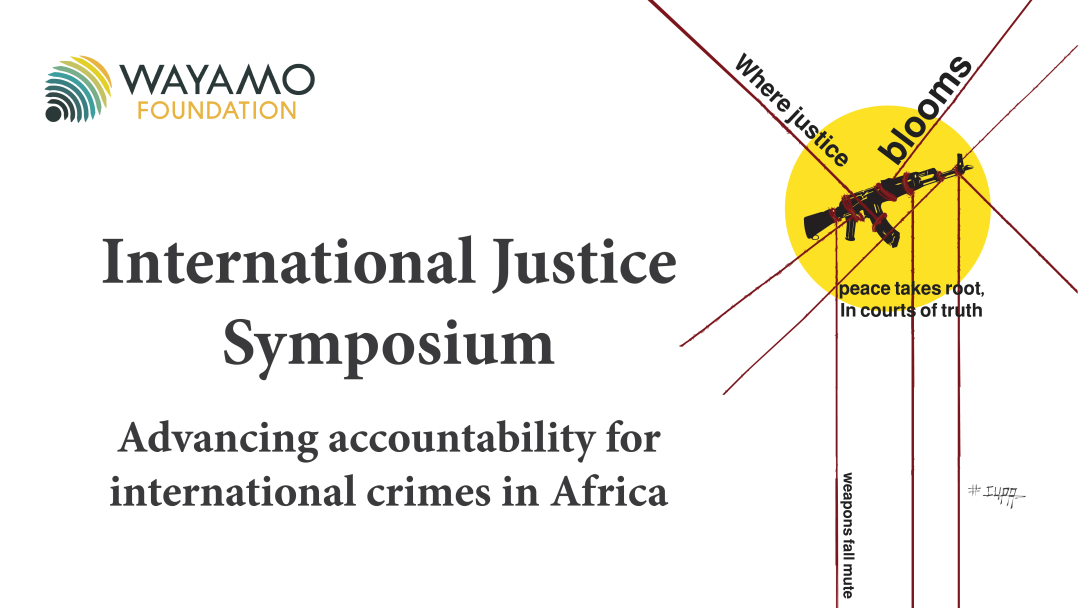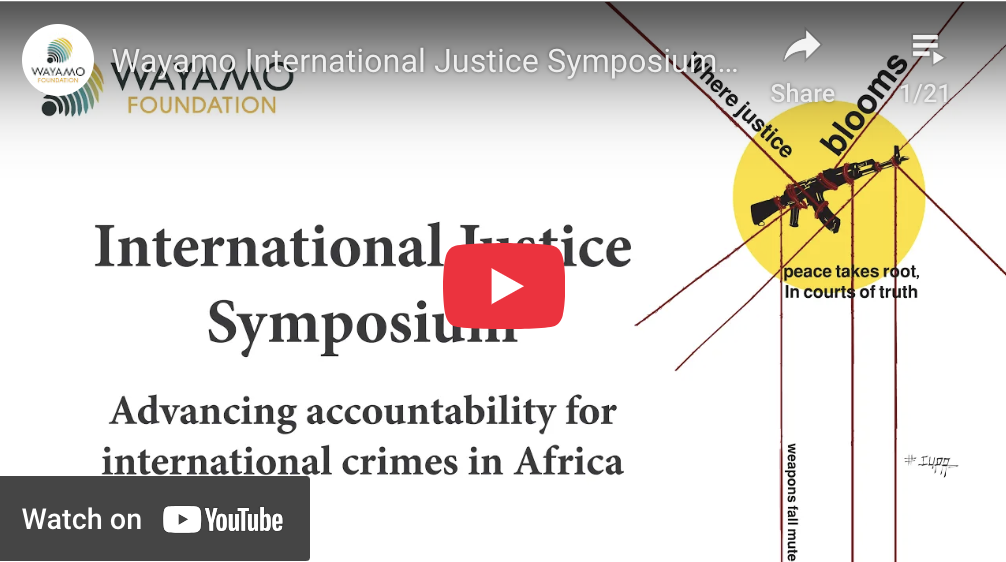On 21 February 2025, the Wayamo Foundation convened experts from across the globe for a symposium on the subject of “Advancing accountability for international crimes in Africa”. The event, held at Nairobi’s Aga Khan University, focused on identifying appropriate and creative means and mechanisms to advance accountability for international crimes.
A full recap is available here, and the entire symposium can be viewed online at the link below, or sequentially on this page by clicking the names of the speakers.
Introduction from Wayamo Director Bettina Ambach, and introduction of the artwork from Sudanese artist Mohamed ‘Cupa’ Alhassan (Instagram) and photography from award winning Sudanese photographer Faiz Abubakr Mohamed, (Instagram) renowned for his compelling documentation of Sudan’s socio-political landscape, which were also featured at the Symposium.
PANEL 1: A Framework for Justice: Identifying pathways to accountability in Sudan through regional and international human rights investigative mechanisms and international courts
Watch Panel 1 on YouTube & Panel 1 Q&A.
Mohamed Chande Othman, Chairperson of the UN Fact-Finding Mission on Sudan outlined the findings of his team and called for more to be done to stop the violence.
Pubudu Sachithanandan, trial lawyer and lead for recent crimes in Darfur at the Office of the Prosecutor of the International Criminal Court (ICC), outlined the limitations of its mandate which is limited to Darfur, but pointed to the success of the recently concluded Ali Muhammad Ali Abd-Al-Rahman commonly known as “Ali Kushayb” case as a “small success” that points to the possibilities of the ICC.
Stella Ndirangu, AU Advocacy Lead at the International Federation for Human Rights (FIDH) called on the African Union to pursue complementary efforts as well to bring justice to the victims in Sudan.
Commenting later in the day, Donald Deya, Chief Executive Officer, Pan African Lawyers Union (PALU), suggested that accountability is possible, and spoke about the African Union’s position on universal jurisdiction.
PANEL 2: Domestic justice for international crimes: Examples, successes and challenges
Watch Panel 2 on YouTube & Panel 2 Q&A.
Judge Isaac Lenaola of the Supreme Court of Kenya opened the panel with remarks on advancing the rule of law in Kenya and opportunities brought about by the Rome Statute of the International Criminal Court.
Mark Barasa, Kenya’s Senior Assistant Director of Public Prosecutions also gave an update on the case from the audience.
Sara Kasande, who leads the Kampala office at the International Centre for Transitional Justice, spoke about international criminal law in Uganda, providing a comparative analysis of both domestic and international case law and the lessons learned for future accountability initiatives.
Tina Alai, Transitional Justice Advisor, United Nations Commission on Human Rights in South Sudan, noted the importance of tracking crimes across borders due to regional disruptions and recalled the long trek toward accountability in Kenya where incremental change has followed numerous setbacks.
Adejoké Babington-Ashaye, International Law Expert with a focus on accountability for sexual and gender-based violence, noted that political will undeniably shapes international justice efforts, however, history teaches us that power shifts occur and those fighting for justice must be ready when the time comes.
A conversation with the International Criminal Court
Following the second panel, Mark Kersten, Wayamo’s Senior Consultant and Assistant Professor of Criminology and Criminal Justice, University Fraser Valley, Canada, engaged in a conversation with Pubudu Sachithanandan, lead for recent crimes in Darfur at the Office of the Prosecutor of the ICC on the meaning and importance of the ICC’s 2024 policy on complementarity and whether the court can work proactively with national authorities to investigate and prosecute international crimes. Watch the Conversation on YouTube.
PANEL 3: Creative ways to interrupt the perpetration of international crimes in Sudan
Watch Panel 3 on YouTube & Panel 3 Q&A.
Sudanese legal expert Mohamed El´numan laid the groundwork with an analysis of the possible political outcomes of the Sudanese conflict, noting that justice inside Sudan would be extremely difficult to achieve.
Nick Leddy, Head of Litigation, Legal Action Worldwide (LAW), highlighted his organisation’s efforts at strategic litigation outside Sudan.
Christopher Kiyaseh, Analyst, Center for Advanced Defense Studies (C4ADS) highlighted his organisation’s work in using deep research and data layering to better understand and where possible disrupt the criminal networks in Sudan. He pointed to the example of conflict financing through banks.
Wayamo’s Senior International Legal Advisor Mikel Delagrange picked up on the need to be creative because the accountability landscape has changed and stressed the importance of civil society organisations and documentation efforts that can meet a legal standard.
Kaajal Ramjathan-Keogh, Director of the Africa Programme at the International Commission of Jurists, South Africa, weighed in on the creative application of universal jurisdiction in Africa with multiple legal examples of creative prosecutions across the continent and worldwide.
Cooperation, coalitions and keeping the victims at the centre of justice and accountability efforts
Wayamo’s Bettina Ambach had the last word of the day, stressing the importance of cooperation and collaboration in her closing remarks.



